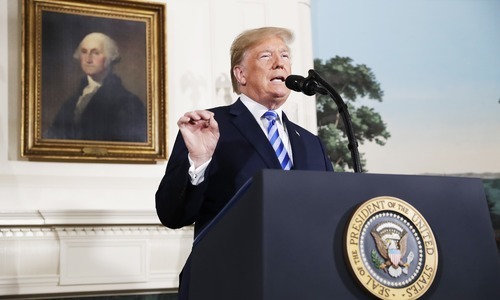There may not be much Iran can do about President Donald Trump’s withdrawal from the nuclear deal, but across the Middle East, it has a variety of ways it can hit back at the United States and America’s regional allies.
Iran has expanded its influence far beyond its borders in recent years, sponsoring an army of tens of thousands of Shiite militiamen spread across Iraq and Syria, all the way to Lebanon. A rocket attack overnight on Israeli positions in the Golan Heights may have been a first salvo, underscoring Tehran’s reach. Israel responded with a blistering wave of missile strikes early on Thursday.
Iran also holds enormous political sway in neighboring Iraq and in Lebanon, where its main Shiite ally, the militant Hezbollah group, scored significant gains in weekend elections. In Iraq, two powerful political alliances expected to win seats in parliamentary elections on Sunday also maintain strong ties to Iran.
In his speech announcing the US withdrawal from the landmark 2015 nuclear deal, Trump called Iran the “world’s leading state sponsor of terror”, citing its support for “terrorist” proxies and militias such as Hezbollah and Hamas, as well as its activities in Yemen.
The rivalry between Iran and Saudi Arabia has torn the region apart, playing out on regional battlefields and fanning sectarian flames in Iraq, Syria, Lebanon, Bahrain and Yemen. Trump’s decision will likely intensify those confrontations, and could also embolden Israel to step up its own proxy battles against Tehran.
Here is a look at proxy battlefields in Iran’s looming confrontation with the US, Saudi Arabia and Israel:
Syria and the Golan Heights
Any confrontation between Iran and Israel is likely to play out first and foremost on the battlefields of Syria, where Iran has built an extensive network of militias during Syria’s civil war. Advisers from Iran’s elite Revolutionary Guards, as well as trainers, commanders and experts, are stationed in military bases across the country.
It also has spy drones that it can use to attack from the sky. In February, Israel shot down what it said was a drone that contained explosives sent by Iran from an air base in Syria, prompting Israeli airstrikes that killed at least seven Iranians. An Israeli warplane was shot down during the battle.
Israel’s main concern is southern Syria, near the Israeli-controlled Golan Heights, where Tehran has been boosting its presence for years and where it could launch rocket attacks into Israeli territory.
Israel has said it will do what it takes to fend off Iran’s military entrenchment. A series of strikes over the last few months — all blamed on Israel — have struck Iranian assets in Syria and killed Iranian forces there.
The strikes have prompted threats of retaliation from Tehran, and Israel has girded for a response, ordering bomb shelters open in the Golan.
Israel will no doubt strike back following any attack on its territory, a scenario that could spiral into a wider conflict that experts say no side is currently interested in.
With Trump’s backing, Israel may even feel emboldened to take further pre-emptive action against Iranian targets in Syria. Iran’s presence in Syria is no match for Israel’s powerful military, and Iran’s hopes of salvaging the deal and appearing moderate on the world stage may further hinder its ability to strike back.
Lebanon and Israel
Southern Lebanon’s rolling hills bordering Israel are another arena of influence for Tehran through its Lebanese proxy, Hezbollah.
The frontier has been largely quiet since the last Israel-Hezbollah war in 2006, and Hezbollah is averse to starting a new confrontation in light of its costly intervention in Syria, where it has lost hundreds of fighters.
Read: Hezbollah: the crown jewel of Iran’s spreading influence
Launching a new war could endanger Hezbollah’s political support base, including its Shiite constituency, which is wary of another ruinous war with Israel.
Hezbollah has said, however, that it stands ready to defend Lebanon in case of any Israeli attack, and its leader has hinted it may retaliate for repeated Israeli airstrikes in Syria.
Israel has repeatedly targeted weapons shipments destined for Hezbollah, taking advantage of the group’s thinly-spread fighters preoccupied by the war in Syria.
With the war winding down and the group able to refocus on its longtime foe, Israel, the border between the two countries may again heat up. Embroiled in scandals at home, Israeli Prime Minister Benjamin Netanyahu may also seek a provocation to divert attention from his domestic crises.
Yemen and Saudi Arabia
The war in Yemen, widely seen as a proxy battle between Saudi Arabia and Iran, is another theater Tehran could exploit to inflict pain on its enemies.
Yemen’s Shiite rebels, the Houthis, have fired a series of missiles into neighboring Saudi Arabia during the three-year-old conflict, most recently on Wednesday, a day after Trump’s announcement.
The United Nations, Western nations and Saudi Arabia say Iran supplies the Houthis with long-range missiles capable of reaching Riyadh. Iran denies arming them.
Gaza and Jerusalem
Confronted by Iranian-allied Hezbollah on its northern border, Israel also faces another enemy to the south with Hamas in Gaza.
Tehran’s relationship with the Islamic militant group has known highs and lows. Hamas developed close ties with Iran after the outbreak of the second Palestinian uprising in the early 2000s, with support — both military and financial — peaking following Hamas’ victory in the 2006 parliamentary elections.
In pictures: Thousands gather for sit-in along Israel-Gaza border
Ties ebbed with the outbreak of the Syrian war in 2011, when the Hamas leadership-in-exile left Syria amid President Bashar Assad’s crackdown on Sunni Muslim rebels, many with ideologies similar to those of the Muslim Brotherhood, the parent movement of Hamas. Ties with Iran have since somewhat recovered, and Hamas is believed to again get funding from Iran.
Since late March, Hamas has been staging weekly mass protests meant to break a stifling, decade-long Israeli-Egyptian blockade on the impoverished territory. Thousands of Palestinians have demonstrated along Israel’s border fence with Gaza, with some briefly crossing into Israeli territory, hurling burning tires and damaging the fence. Dozens have been killed by Israeli fire and hundreds have been wounded.
The protests are set to intensify on Monday when the US Embassy opens in Jerusalem. Tens of thousands of Palestinians are set to descend on the border area and mass breaches of the border fence may be inevitable.
Iraq
Iran sponsors a range of Shiite militias in Iraq and has deep ties to the country’s economy and political system. Many Iraqis fear escalating tensions between the US and Iran will destabilize Iraq just as the country is starting to recover.
Riad Hadi, an Iraqi army veteran, said Iraq will end up paying the price for Trump’s withdrawal from the nuclear deal.
“If they blockade Iran, the pressure release will be Iraq,” said the 48-year-old, who was wounded in both legs in a bomb blast in his Baghdad neighborhood.
On Wednesday, a powerful Iraqi paramilitary group with links to Iran said Trump’s withdrawal from the nuclear deal would “ignite the region.”
“We are resistance factions and we are ready to target Americans in the region in case America hits Iran. It will be a violent response,” said Jafar Husseini of Iraq’s Hezbollah brigades.
There are some 5,000 US troops in Iraq training Iraq’s military after the country declared victory over the Islamic State group last year.
Assassinations and attacks
Amid rising tensions between Israel and Iran, a return to assassinations and overseas attacks cannot be ruled out.
Iran blamed Israel for the assassination of at least four Iranian nuclear scientists between 2010 and 2012 and arrested a number of Iranians alleged to have carried out the killings on behalf of Israel’s Mossad spy agency.
In 2011, US officials said they foiled an Iranian plot to assassinate Saudi Arabia’s ambassador to the United States, Adel al-Jubeir, the current Saudi foreign minister.














































